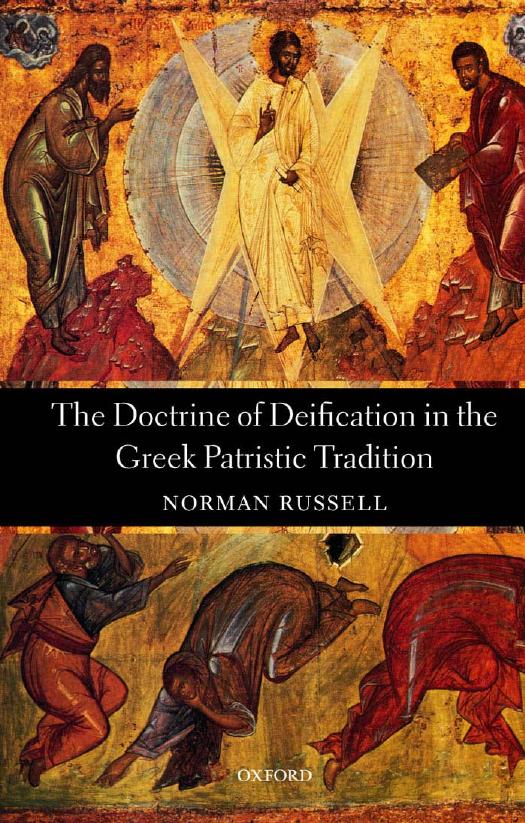The Doctrine of Deification in the Greek Patristic Tradition by Norman Russell

Author:Norman Russell [Russell, Norman]
Language: eng
Format: epub, mobi, pdf
Tags: Fiction, Fathers of the church, Orthodox, Filosofia patristica., larpcal, Christianity, Anthropology, Religion, Deification (Christianity), Early church; ca. 30-600, History of doctrines, General, Christian Theology, History
ISBN: 9780199205974
Publisher: Oxford University Press
Published: 2006-09-22T10:42:46.276000+00:00
The Alexandrian Tradition II
201
preferred means of expressing how human beings appropriate the divine life.34 The frequency of his citation of the text is quite remarkable. He uses it on numerous occasions to suggest succinctly the trinitarian dimensions of salvation. The active role of the Spirit is particularly prominent: ‘for we are justified by faith and are proved to be partakers of the divine nature by participation in the Holy Spirit’ ( In Jo. 9. 766b). Christ revealed the Holy Spirit, but it is the Holy Spirit that makes Christ’s indwelling in the believer possible: ‘through him and in him we are conformed to the archetypal beauty, reborn in this way into newness of life and reformed into divine adoption’ ( In Jo. 2. 1. 147a). Baptism into Christ through the Spirit enables us to participate in the divine nature not in an ontological sense but morally. It is the moral aspect of our kinship with Christ which is emphasized by the reference to ‘the archetypal beauty’. The ugliness of sin is left behind as we are remodelled according to the standard of moral beauty set by Christ. But that is not the end of the matter. Through Christ we have access to the Father. ‘Partakers of the divine nature’ always implies a dynamic relationship through the Spirit in Christ with the Father.
Cyril rarely comments directly on 2 Peter 1: 4. The following passage is perhaps the closest he comes to an exegesis of the text:
How are we ‘God’s offspring’ (Acts 17: 29)? In what way are we ‘partakers of the divine nature’ (2 Pet. 1: 4)? We do not limit our boast merely to the fact that Christ wished to take us into an intimate relationship with him. No, the truth of the matter is evident to us all. For ‘the divine nature’ is God the Word together with the flesh.
And we are his ‘offspring’ even though he is God by nature, on account of his taking the same flesh as ourselves. Therefore the mode of the relationship rests on likeness (ουκο ν µφερ τ ο κει τητο τρ πο ). For just as he is intimately related to the Father, and the Father through the identity of nature is intimately related to him, so we too are intimately related to him –– in that he became man –– and he to us. We are united (συναπτ µεθα) to the Father through him as through a mediator. For Christ is, so to speak, a frontier (µεθ ριον) between supreme divinity and humanity, since both are present within him. And containing within himself, as it were, these two vastly discrete things, he is united (συνα´πτεται) on the one hand to God the Father, since he is God by nature, and on the other to human beings, since he is truly human.
( In Jo. 6. 1. 653de)
Cyril’s fundamental conviction is that God is encountered in the person of the incarnate Word, Jesus Christ, who unites within himself the ‘two vastly discrete things’ (τα` τοσο τον δι κισµ να) of the human and the divine.
Download
The Doctrine of Deification in the Greek Patristic Tradition by Norman Russell.mobi
The Doctrine of Deification in the Greek Patristic Tradition by Norman Russell.pdf
This site does not store any files on its server. We only index and link to content provided by other sites. Please contact the content providers to delete copyright contents if any and email us, we'll remove relevant links or contents immediately.
The Gnostic Gospels by Pagels Elaine(2527)
Jesus by Paul Johnson(2352)
Devil, The by Almond Philip C(2325)
The Nativity by Geza Vermes(2226)
The Psychedelic Gospels: The Secret History of Hallucinogens in Christianity by Jerry B. Brown(2149)
Forensics by Val McDermid(2088)
Going Clear: Scientology, Hollywood, and the Prison of Belief by Lawrence Wright(1978)
Going Clear by Lawrence Wright(1962)
Barking to the Choir by Gregory Boyle(1819)
Old Testament History by John H. Sailhamer(1809)
Augustine: Conversions to Confessions by Robin Lane Fox(1769)
The Early Centuries - Byzantium 01 by John Julius Norwich(1738)
A History of the Franks by Gregory of Tours(1720)
A Prophet with Honor by William C. Martin(1717)
Dark Mysteries of the Vatican by H. Paul Jeffers(1715)
The Bible Doesn't Say That by Dr. Joel M. Hoffman(1677)
by Christianity & Islam(1627)
The First Crusade by Thomas Asbridge(1601)
The Amish by Steven M. Nolt(1563)
